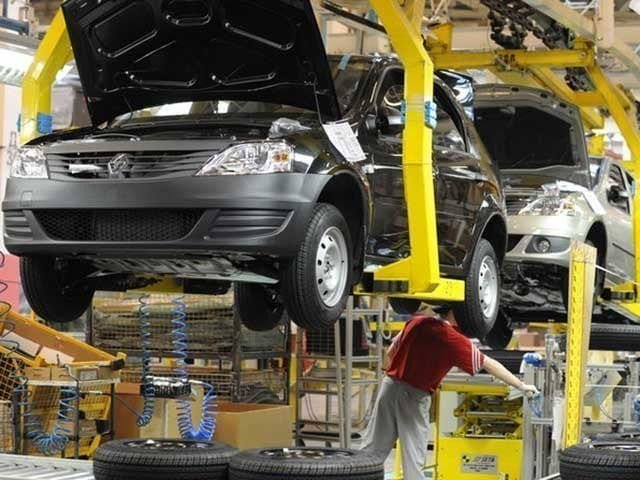Auto companies say efforts being made to expedite vehicle delivery
Indus Motor CEO states industry has paid Rs1.5 billion to customers for late delivery

Indus Motor CEO states industry has paid Rs1.5 billion to customers for late delivery
PHOTO: EXPRESS
Customers still have to wait for six months before the booked new car is handed over to them. This delay prompted the Competition Commission of Pakistan to take action against the existing auto assemblers who had dominated the country’s market for decades.
Now, the government has allowed around eight new players to manufacture cars in Pakistan which will break the monopoly of existing three assemblers of Japanese vehicles.
Indus Motor increases car prices by up to Rs300,000
Voicing concern over market practices of the old auto industry players, the Competition Commission held a public hearing on Thursday.
During the hearing, the stakeholders expressed their anger over the slow delivery of cars and demand for extra payment. The government has set a period of two months in the new auto policy for the delivery of cars, but still the assemblers are delaying the process and cars are not available in less than six months.
Indus Motor Company (IMC) Chief Executive Officer Asghar Jamali represented the auto industry, along with representatives of Honda Atlas Cars and Pak Suzuki Motor Company, at the hearing.
Jamali pointed out that IMC had cancelled thousands of orders in cases where multiple vehicles were booked on the same Computerised National Identity Card (CNIC) over the past two to three years.
“IMC is continuously making efforts to identify these investors and curb the practice of charging premium on cars. Moreover, the company has made the process transparent as IMC website is the easiest way for the customers to track their orders,” he said.
He claimed that IMC was paying Karachi Inter-bank Offered Rate (Kibor) plus 2% to its customers for late delivery of booked vehicles. So far, Rs0.5 billion has been paid by IMC and Rs1.5 billion by the industry as a whole on this account.
However, Jamali regretted that government’s response to the company’s proposals against premium payment was still awaited. “No action has been taken against the wholesale/retail system and suggestions about transfer tax are still awaited,” he said.
“The auto industry is consistently making efforts to curb the demand for premium and has invested approximately $140 million in capacity enhancement,” he emphasised.
“All OEMs (original equipment manufacturers) operating in Pakistan work under the Technical Assistance Agreement with their global counterparts and strictly adhere to all of their global standards with respect to production and quality.”
Outlining the efforts made for increasing the share of locally produced parts in vehicle production, Jamali pointed out that the industry was using more than 60% local parts in its flagship products and it continued to study the techno-economic feasibility of further parts.
Locally assembled auto sales rise 9% to over 22,000 units
However, he said, raw material for all locally produced parts needed to be imported as Pakistan did not manufacture auto-grade steel sheets and resin - the primary raw material for all auto parts.
Defending the recent price hike, Jamali explained that the rupee had weakened by almost 10% whereas the auto manufacturers increased prices by only 3-4%. Furthermore, the regulatory duty on raw material imports increases the cost of steel and higher utility services cost due to electricity load-shedding also adds to the cost pressure.
He emphasised that almost all OEMs had either enhanced their capacity or were in the process of expansion.
IMC has recently invested $40 million and enhanced its capacity by 20% to meet the growing demand and shorten the vehicle delivery period.
Pak Suzuki has invested $63 million over the past two years and plans to pour a further $460 million. Honda Atlas has also planned to invest $35 million.
Published in The Express Tribune, April 13th, 2018.
Like Business on Facebook, follow @TribuneBiz on Twitter to stay informed and join in the conversation.



















COMMENTS
Comments are moderated and generally will be posted if they are on-topic and not abusive.
For more information, please see our Comments FAQ